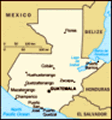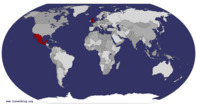Advertisement
Published: January 15th 2006
....I mentioned to her my idea of volunteering, she dismissively responded saying she saw much volunteering and much charity given but little changing. I explained that it´s small potatoes for what is given with one hand and grab back twice over through the near-hidden means of business and economics. This isn´t to say that it isn´t worth doing the forementioned, and the very fact many people think like this is part of the problem. For example it´s lots of singular votes which makes up an election.
But this is little different. The whole development issue isn´t simply a matter of money, it´s much more complex than that. Furthermore few things in this world are completely independent of one another. An example of such a link is increased tourism. Increase tourism doesn´t just bring in money to all places it´s spent, it changes the set-up of towns, it changes the culture, it changes the way people think about the world, it encourages people to change their occupation to suit tourism, it encourages Governments to protect tourists. I could go on and on, all of these things and more are affected to some degree, and to say whether or not things have got any better doesn´t seem to even come down to a simple answer. How is it possible to tell? With so many things being near impossible to measure, but it goes deeper. It strikes the fundamental question of what changes are good or bad in the first place, and isn´t this in most cases completely subjective to individual viewpoint. People talk about poverty or the standard of living being bad somewhere, yet I think few actually know what exactly they are talking about in the first place.
How do you judge standard of living, of happiness, who chooses the paramaters for deciding this and their various weighting, is a higher GDP better if a lifestyle is interrupted? Is good weather, a good view, friends, family counted?
I know I´m just asking more questions than I´m giving answers here, with the former being much easier than the latter because you have nothing to defend this way. It´s like Religion, atheists feel proud questioning people religions and waiting for them to be inconsistent to try to signify they are wrong, knowing nothing can be said in reply because they are the one asking the questions. But it is a fallacy to think that someone badly defending a viewpoint means the viewpoint is automatically not true. For this very reason it is impossible to say with any certainty Religious beliefs are false particularly if you perhaps take the Bible to be potentially distorted information, it doesn´t mean the core beliefs are wrong. This same argument also shows you while the legal system in most countries is ridicilous. The whole idea of one person being allowed a better lawyer and research team than the other just because of wealth is insane logic, yet it is rarely questioned.
Returning to the main point here, How could a person possibly tell if things were better or not? What was judging it on anyway? And besides this women had been here not even a year (hardly a realistic time frame) and had never visited before (over a reasonable time frame). In summary, like most people like to do, (I appreciate the irony here with regards to myself) she was making a sweeping judgement on things rather than actually questioning whether she understood the question she was asking in the first place!
Moving on, assuming that the generally accepted measure of things improving means economic development, improvements in health, education and basically converging on the western world (a dubious target in general) I will carry on from the small potatoes bit above. Economics, historical political instability, cultural differences, racism and suppression from colonial times (worse in all parts in places with high numbers of ethnic groups) and war are the main reasons for the differences in Economic wealth. With many of these factors being dependent on one another.
It´s also a fallacy that good natural resources creates wealth, history teaches us that often it just attracts conflict, discrimination and greed. For example why does the country with possibly the best natural riches in Latin America, Bolivia, is also the poorest, the reasons above. Foreign companies historically have paid slave wages to take home massive profit margins, at the same time greedy governments come to power for selfish reasons rather than the right reasons (actually this could be applied to all levels of society). This creates conflict, corruption, rebellion and war. And if a left wing government comes into power it either swings towards communism (taking the black and white approach mentioned in previous articles) and/or comes head to head with companies, and subsquently power people, to create other problems. In either case the CIA often helps overthrow the government or repress an uprising. Over throwing popular governments creates more problems, discourages any positive foreign investment and often causes war.
This is how Che Guevara met his untimely end and Evo Morales, the new democratically (fairly) president with over 50% of the vote would almost certainly meet the same end in another time. But thankfully due to today´s worldwide media (one of there few good sides) it is almost politically impossible.
The US preach democracy at all costs but this translates in actions as not a dictator and friendly to the US and it´s companies interests.
Other examples are Angolo and Congo, two of the poorest countries in the world with some of it´s best resources including the black gold, oil.
While the regional example of the reverse being true is Costa Rica. With little of obvious use a few relatively tranquil Spaniards settled there and more passively mixed with the locals, while the greedy went else where. These strong roots helped build a model of democracy and (more importantly) peace and justice. This allowed industry and agriculture to prosper through coffee production and later through more diverse means including tourism. Corruption didn´t really exist through lack of greed and the country has prospered (more on this in a few months time when I drop in),
In Guatemala itself, vast inequalities in wealth, dodgy politics and racism from colonial times were the principal problems (worse in Guatemala than other Latin Am countries because of high numbers of indigenous people not easily suppressed from powerful white people. In Argentina they had years of proserity because they brutally killed most of the indigenous people eliminating that area, while the highlands of many countries are the reason while the indigenous population is so high- due to inaccessibility in olden times).
However most of these problems looked to be having a possiblity of being resolved in the 1940s and 1950s with promised land reforms and promises to help the poor, subsquently reducing conflict and making prosperity possible.
United Fruit Company (UFC from now on), pretty much owned Guatemala for nearly 50yrs thanks to corrupt governments with indigenous workers legally forced to work their land. They also owned railways and built roads, and created a monopoly in all fields (basically created the problems of the inefficiency of Government yet instead of the money in round about ways making it into the country it all disappeared outwards). The CIA, protecting US companies interests, but officially trying to prevent communism, supported a revolt from Honduras which succeeded in bringing back to power more un-popular governments and increasing discontent.
With this terrible political act and the UFC in general becoming better known, the US tried to distance itself from them. A court case caused heavy losses to the UFC and their involvement in Guatemala soon disappeared. However the harm had already been caused. A few years later the 36 year Civil war started, again making development impossible. Along with this several hundred thousand people, mostly indigenous, died. Some moved to Chiapas (increasing the problems and complexity of issues there), others to the US and Europe. The war has stopped now but corruption and discrimination remain. You could almost blame UFC for unintentially causing the civil war.
A good book titled ´Guns, Germs and Steel´deals with world development issues, paticularly the most historic bits in great depth, although I think it´s very dry it´s worth reading for anyone with much interest in this.
A simplistic look at Economics tells most of the rest of the story. Splitting sectors into Primary (farming, agriculture), Secondary (Manufacturing) and Services (Banking, finance, research and tourism) also helps simplify the situation. Wealthy countries specialise in the most profitable, skilled, developing and specialised latter ones and export this knowledge at high rates (where it´s possible to do so). Poor countries are reliant on the less profitable and less reliable ones. This is normally practised labour intentisively and inefficiently, because they need to import expensive machinery to do it otherwise. Transport is slow because of this, with poor quality roods again increasing costs along with the imported fuel. This creates a vicious circle.
Fortunately there are several get out clauses, which Guatemala is now in a better position to use. All end eventually in trying to specialise in the higher order ones. Good education makes this possible in numerous ways and is vital for any country (the area I´m looking to help in, in the form of TEFL). Developing a manufacturing industry or scientific research is another. The latter skipping a category and is currently well demostrated in India. There many scientists spend their time trying to research how to rid the country of diseases, hence reducing poverty and health problems and bringing greater prosperity a step closer. This is not profitable for western pharmacultical companies, or in the interest in the most developed countries and therefore they concentrate on where the money is, plastic surgery for vain house wifes and perfecting cough medicines. This is main reason why so many diseases and forms of diseases remain incurable or hugely expensive to do so. Basically making paper is more important to many then saving lives.
The other quicker and easier way is tourism (not possible in a Civil War of course). This can bring wealth, reduce corruption through forced transparency and creates jobs among many other things. With the decreasing costs of world flights is making the previously unaccessible, accessible. This, and the indifference amongst the disillusioned young is creating a seemingy endless boom industry, which Guatemala, economically at least, is benefiting from.
I explained a very abbreviated form of the above the pre-mentioned women but she, like most travellers, showed little true interest. It is shame, because I find it fascinating and I think there are important lessons to learn from travel but unfortunately many take a more hedonistic approach.
Advertisement
Tot: 0.079s; Tpl: 0.013s; cc: 6; qc: 55; dbt: 0.0458s; 1; m:domysql w:travelblog (10.17.0.13); sld: 1;
; mem: 1.2mb








